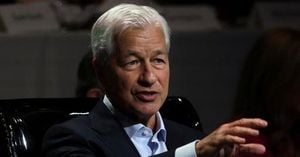The winds of change are blowing through American politics, especially with what seems to be Democrat Tim Walz's ascent as Vice President Kamala Harris's running mate. His progressive environmental stance and innovative policies have sparked discussions about sustainable aviation fuel and climate change.
Walz's commitment to green initiatives is palpable, particularly his support for sustainable aviation fuel (SAF), which is seen as pivotal for the aviation industry's effort to reduce emissions. Aviation, currently responsible for about 3% of global emissions, is projected to climb to 22% by 2050 without substantial changes.
The Governor of Minnesota has emerged as one of the leading voices advocating for SAF, and his administration recently signed significant tax credits aimed at encouraging its development. He envisions Minnesota becoming a global leader in this burgeoning market, equipped with all the necessary components, including refineries and top-tier airports.
Just last year, he announced the launch of the Minnesota SAF hub with the backing of major players like Delta Airlines and Xcel Energy. This initiative positions Minnesota front and center as it aims to scale up SAF production to meet rising demands.
While sustainable aviation fuel is derived mainly from plant oils and waste fats, the industry still faces skepticism about its long-term viability. Critics argue whether the fuel can genuinely supply enough to meet airline needs and concern about its real climate benefits.
Walz's progressive transformation as he transitioned from House representative to governor has many scratching their heads. The narrative surrounding his environmental record is mixed; having once voted for the Keystone XL pipeline, Walz now champions significant climate legislations.
During his tenure as congressman for Minnesota’s 1st District, he focused on issues more aligned with agriculture and veterans' affairs than with hard-hitting climate agendas. Colleagues remarked on his limited impact on climate policy during those years, with not many recalls of his environmental achievements.
Yet, advocates assert his growth reflects broader changes in political priorities rather than mere personal evolution. Once seen as straddling the fence on environmental issues, Walz is now recognized for actively tackling climate challenges head-on as governor.
His leadership has seen Minnesota implement some of the nation’s strictest vehicle emission regulations and establish ambitious goals for clean electricity and net-zero emissions by 2040. This shift has garnered praise from environmentalists who see Walz as now embodying the leadership necessary for tackling climate issues.
The Inflation Reduction Act incentivized sustainable aviation fuel production through tax credits, significantly supporting Walz's push for greener energy. Yet, the looming expiration of these credits raises concerns among producers about future gains.
Environmentalists, on the other hand, have raised red flags about the pair of powerful forces backing Walz and their potential to alter the existing agricultural and energy landscapes. There’s tension surrounding the risks of SAF affecting food production, as new shifts could favor corporate agricultural interests over smaller, independent producers.
Critiques of Walz often reference his history of supporting fossil fuel projects and legislative initiatives beneficial to conservation projects funded through expanded oil and gas drilling. These actions sparked questions about his commitment to the strict environmental advocacy he espouses today.
While many have expressed doubts about Walz’s initial environmental records, his recent policies appear to have brought him back to the forefront of climate conversations. Colleagues from his congressional days have acknowledged his evolution alongside the shifting demands of his role.
His transformation mirrors the increasing urgency from Democrats to confront climate change, reflecting evolving voter expectations and serious political realities. The need for comprehensive action dwarfs the old status quo, pushing leaders to adopt greener policies to respond effectively.
A former aide pointed out the fact-based approach Walz takes toward evolving positions; rather than being rigid, he pivots as the evidence and circumstances change. This flexible thinking has positioned him well within the current political zeitgeist, which increasingly demands serious climate action.
Despite past missteps, his voting record scored reasonably well against environmental groups during his time as congressman. He voted with progressive causes about 75% of the time, which is somewhat low for Democrats, yet his advocacy for biofuels and renewable energy remains noteworthy.
Colleagues and aides have characterized Walz as adaptable and aligned with core Democratic values, possessing the ability to work beyond party lines when necessary. His consistent transparency fosters trust and opens loyalty to bipartisan collaboration, allowing for bold climate action.
Despite some controversial votes during his twelve years on Capitol Hill, many believe his overall contributions have been grounded within the broader goals of environmental protection. His vote supporting landmark climate measures, even amid pushback from farms and energy sectors, shows dedication to balancing concerns.
Throughout Walz's evolution, he has also championed nuclear energy, reaching out for collaboration on breaking the gridlocks stalling its adoption. This push shows another side of his environmental ambitions and suggest willingness to explore diverse energy solutions.
Walz’s experience renders the prospect of overseeing ambitious environmental initiatives as vice president viable, poised to impact climate policy positively. Election watchers will now closely monitor how his evolving narrative influences the campaign trail leading up to 2024.
There's no doubt the Democratic ticket with Walz on board will continue emphasizing their commitment to protecting the environment amid rising climate challenges. The upcoming election creates immense opportunities for them to showcase their resolve to transition toward cleaner energy and safeguard ecosystems.
Although some critics question the sincerity of Walz’s environmental evolution, his role as governor has strengthened his position as one of the Democratic Party’s climate champions. He may face scrutiny during upcoming debates, but his pragmatic approach could appeal to various voter bases across the political spectrum.
The stakes are high for all politicians as they continue grappling with the mounting pressures of climate change; the time for decisive action may have finally arrived. Walz's engagement with sustainability and environmental issues may just solidify his legacy as one determined to tackle climate head-on, ushering in meaningful change at the federal level.



